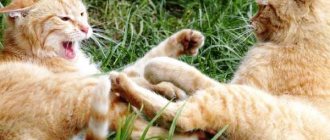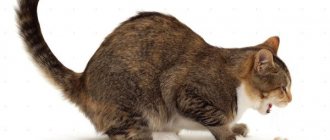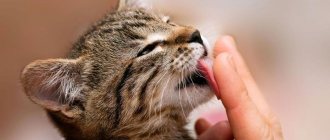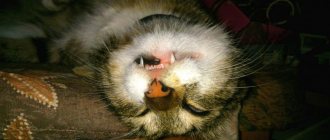Cats, like people, have their own character, mood, and emotions. What we can express in words, in an animal, is transmitted to the surrounding world by sounds, but more primitive ones, for example, growling. When wondering why your cat is growling at you, think about what was wrong with your behavior that caused such a reaction. And the ancient habits of wild hunters sometimes remind themselves of the need to protect their prey, warning with a roar that it already has an owner.
Fear as a reason for growling
Hissing and growling associated with fear appears due to insufficient attention to the kitten. If the kitten rarely had contact with people, did not receive proper attention from them, or even suffered insults or even beatings from them, then fear of people will accompany an already adult cat. To understand that it was fear that caused the growling, pay attention to the following factors:
- a cat can rush at its owners in the presence of a certain stimulus, real or imaginary;
- if a pet is “cornered”, it hisses and growls much more intensely;
- aggression is accompanied by appropriate warning postures;
- the pet can connect its paw swings to the growl;
- when the situation comes to its logical end, the animal begins to relieve stress, for example, by licking the fur.
You cannot punish a cat for such behavior, since with such tactics it will always expect bad things from a person.
Why does a cat growl and hiss?
Growling, purring, hissing and meowing are the only sounds that cats use to indicate their mood. When figuring out why a cat growls and hisses, we must not forget about its wild origin.
Psychological reasons
The cat expresses the entire range of its emotions exclusively through body language, periodically supplementing it with several variations available to it. There are few of them, but with their help the animal manages to convey to humans a huge number of experiences that need correct interpretation.
Social aggression
It occurs if a person annoys with excessive caresses. Any cat behaves quite coolly until it wants the owner’s tenderness. She will come up to attract attention, begin to rub against your legs, caress, prop up her back or ask to be held.
But tenderness (according to the cat) must be dosed - as soon as you overdo it with caresses, he will turn from an angel into a devil. At this moment, he is able to bite his hand, hiss and rattle his tail in displeasure, showing that the limit of his patience has been exhausted.
Redirected aggression
A similar state can be experienced by cats that are frightened/angry by something in the presence of a particular person.
! It is not surprising that he causes unmotivated cat aggression by his very appearance. The animal is isolated and allowed to recover.
Thanks to excellent associative memory, a witness to an unpleasant incident turns into a source of negative memories for the cat.
Fear
A cat growls and hisses if it is fueled by fear due to insufficient socialization or, much worse, harassment and beatings (experienced from an early age).
If the growl is caused by fear, the markers of the latter will be:
- attacking people in the presence of a real/imaginary stimulus;
- growling, supplemented by paw swings;
- increased hissing/growling when the cat is cornered;
- clear warning postures;
- final accentuated licking of fur.
A cat whose fears originated in childhood needs increased attention and patience . She is not punished, but gently re-educated.
Domination
Once in the house, the animal will definitely build its own hierarchical scheme, headed by the leader: and it’s good if she chooses one of the household members, and not herself, to play the role of the latter.
If a cat considers himself dominant in the family, he will immediately begin to prove his dominant role.
Here he will come in handy with growls, hisses and claws, with the help of which he will repel all unauthorized attempts to enter his personal territory.
Important! Anyone who touches the cat's things (which can even be feces) will be attacked and expelled. That is why it is in the owner’s interests to point out to the cat its subordinate position from the first days.
She must recognize someone from the family as the alpha male: but this lucky person will not only be treated kindly, but will also feel the cat’s jealousy.
The cat will try to be jealous of everyone who will enjoy his attention - relatives, friends, children and other domestic animals.
Remember that cats have a hard time getting used to all the changes that occur in your family (departure, divorce, travel, or the birth of babies).
Injuries, illnesses
Your cat may look quite healthy, which does not at all exclude some diseases that are smoothed out or that arose not so long ago. Internal discomfort leads to unusual behavior, which is expressed, in particular, by unmotivated aggression.
! If we are talking about illness, increased nervousness is often accompanied by refusal to eat/drink, apathy, frequent licking of fur and biting some parts of the body.
Tail biting
You may notice your pet trying to bite its tail and hear an angry hiss as it tries to prevent it. Sometimes the cat chews its tail at night, when everyone is lying down on the side.
The reasons for such a disorder can be various events:
- moving to a new apartment;
- birth of a baby;
- lack/decreased attention;
- other psychological trauma.
This kind of cat behavior must be stopped by getting to its source. Otherwise, the animal faces tail amputation.
Pregnancy
A cat growls and hisses when she is preparing to become a mother or immediately after giving birth to kittens, especially if a person has managed to undermine her trust. It will have to be restored, showing the pet that you will not hurt her or her offspring. As soon as the animal calms down, the aggressive attacks towards you will stop.
Anesthesia
A disruption in the cat’s usual behavior also occurs after undergoing general anesthesia . Animals have a hard time recovering from anesthesia and at this moment can behave very strangely, including hissing at their beloved owner. However, such a reaction is observed quite rarely, but no matter how the cat behaves, be there, stroke and calm it.
Return
Other factors
Other, very different circumstances also act as catalysts for growling and hissing.
Heredity
It is quite difficult to tame kittens that are born in the wild and have never met people. Such animals (especially at first) are afraid of people, hissing and growling.
Important! Do not forget that each cat has an individual character, the main features of which are determined by genes. If the kitten's father or mother had a quarrelsome and conflictual disposition, most likely he will inherit his parent's cockiness.
That is why, when going to the nursery, you need to observe (and not just for 5 minutes) how adult animals behave. Otherwise, a fighter will settle in your house, whose fighting character you will simply have to put up with.
Territory defense
The cat considers the whole house to be his own, highlighting particularly comfortable zones in it that are best not to be encroached upon. You returned after a long walk, and your pet is not happy about your arrival, turns up its nose and gets angry.
The explanation is simple - he smelled a foreign odor from your clothes/shoes. For you, this is a trifle, but the cat may regard this as an enemy’s invasion of personal territory, in response to which it will begin to hiss and growl.
It often comes to bites, and not only strangers suffer, but also the owners.
Provoking games
A cat growls and hisses if you flirted with it from an early age, exposing your arms and legs. This is the most dangerous reflex that should not be reinforced in an animal. With age, the habit of playing with the claws out will remain, and adult thoroughness will be added to it: the claws will become sharper, the teeth will be stronger, and bites and scratches will be much more noticeable.
! Once the habit of dangerous gambling has taken hold, it will be very difficult to get rid of it. Psychologists advise not to succumb to provocations and show indifference when the cat attacks.
In order for your pet to cool down its warlike ardor, you can leave the room for a while . Scolding and, especially, hitting a cat is prohibited. This will lead to the opposite result - she will become embittered and even more aggressive.
Ochlophobia
Animals, like some people, are susceptible to ochlophobia (fear of crowds). Such pets cannot tolerate large gatherings and when they get into them, they begin to defend themselves, using growls/hisses as a warning.
A cat prone to ochlophobia does not like to play with children and change hands: ignore its warning signals, and it will attack. If you have a noisy company, take the cat to another room.
Return
How to respond to a growl
Several rules will help relieve tension between you and your cat, the choice of which depends on the cause of the conflict:
- if aggression is associated with illness, take your pet to the clinic;
- when demonstrating a fighting spirit, wait 10–15 minutes until the pet calms down (it is better to go to another room during this time);
- after the cat has come to its senses, pet it, talk to it and treat it to something tasty;
- do not stop the cat from growling at your brood - this is one of the methods of education;
- if the cat’s fighting qualities are innate, just come to terms with this fact - you won’t influence the genes, so accept and love your bully for who he is.
Return
about why a cat hisses
Return
Source: https://simple-fauna.ru/pets/cats/cats-health/koshka-rychit-i-shipit/
Frustration
Frustration is a state in which a pet's needs are not met. Scientists believe that this disorder occurs if the kitten is not weaned off cat milk naturally.
As a result, the cat is not able to get its own food. He expects some kind of reward and growls if he doesn't get it. How to recognize this reason:
- the cat hisses at the owner, even if he trusts him;
- the pet growls if in any situation he did not get the desired reward;
- the cat did not receive mother's milk;
- The cat screams loudly and rushes around the door.
This also manifests itself when the owner does not serve food quickly enough, opens the front door, or simply moves away from the pet.
Predator instinct
Everyone is familiar with the game when the owner plays with a kitten, moving his hand or foot under the blanket. It is at this moment that predatory behavior awakens. Only a person perceives this situation as a game, and the pet learns to hunt with all responsibility. This reason is easy to recognize:
- a cat attacks a person from an ambush;
- When you shout back at the cat, the pet begins to behave even more aggressively.
When this behavior goes too far, it becomes a problem.
Maternal aggression
Perhaps this is the only option when a person should not try to correct the behavior of an animal. An angry mother cat is capable of not only attacking, saving the lives of the kittens, the animal will “stand to the death” and fight to the last drop of blood. Before the attack, the mother emits a specific odor, elusive to the human sense of smell.
What to do if a cat that has recently given birth regularly attacks its owners? Firstly, be patient, and secondly, discover and eliminate the cause of the cat’s fears - move the nest to a quieter room, darken the room, refrain from receiving guests. If the cat is preparing to attack, retreat without turning your back to the animal, show open palms and do not try to speak, the mother’s priority is to eliminate the “enemy” without a fight.
Possessive instinct
A cat's instinct of ownership is much stronger than a human's. A pet can growl if it wants to show itself as the master of the situation. Even if the animal is the only one in the house, it is driven by this instinct at the genetic level.
To understand that it is precisely this reason that provokes the growl, just look at the circumstances under which the pet growls.
If he protects food or a favorite toy, it means that the possessive instinct has begun to play in him. What to do in this situation? First, you need to move away from the cat to a safe distance, since growling and hissing are the last warning before an attack. The cat may bite or scratch you.
Interspecies aggression
Anger caused by competition for territory, food or attention of the owner. In a group of animals (even if there are only 2 of them), there is always an “alpha” and her subordinates. Hierarchy is established through showdowns—hissing, displays of force, or even fights. However, from time to time a “subordinate” will claim the place of “alpha”. It happens that two pets live in perfect harmony, share a bowl, a bed and the affection of the owner, and suddenly, one cat shows aggression.
There are several reasons for anger:
- Competition for food or territory.
- Weakened "alpha" state.
You can't change nature and clashes will happen. Exit 2 - tolerate the pets' antics, risking their health, or sterilize the animals. After sterilization, one of the basic instincts in pets is dulled – sexual, which “removes” questions about defending territory or fighting for the hypothetical right to procreate.
Being in a team
If a cat does not like to be in large crowds of people, play with children or roam from hand to hand, it is better to isolate it in the next room. Some animals simply cannot stand large companies and warn not to be touched by growling.
You should not pick up the animal, stroke it, or allow children to play with it, since the cat can also warn of an attack, and its hissing or growling can very soon turn into scratching.
How to calm a hissing cat
A pet that has gone wild in its aggression is a real tyrant for the household. If this is a one-time manifestation, then the actions are simple: just leave the pet alone and not annoy him with your claims. A hissing cat does not crave stroking at all, so you can easily earn a blow from its claws.
But we will consider the owner’s procedure for hissing as a one-time manifestation of the animal’s dissatisfaction.
We invite you to read: Hepatovet for cats and dogs - instructions for use
First you need to eliminate the irritant. If these are guests, then ask them not to touch the animal until it decides to get acquainted. Although very few people will climb up to a hissing cat. Children need to be explained that the pet is not in the mood right now and that they should not annoy him. The upcoming “wedding” can also cause dissatisfaction in the animal. And if you don’t like the cat, then it’s better to offer another “groom” than to aggravate the stress.
Our relatives have a cat who doesn’t like guests at all. When strangers appear, he hides under the sofa and sits there until the visitors leave. He always hisses at everyone passing by (the sofa is shallow, he apparently cannot climb further, so in this way he protects his integrity).
We always explain to children that the cat is not in the mood to play and there is no need to touch it. But one particularly curious child nevertheless decided to poke his nose in his direction, for which he received a paw on the arm. Fortunately, the blow was a warning and did not leave any claw marks. But since then, the children have clearly remembered that it is better not to go near a hissing animal.
A hissing cat can scare people. In any case, force him to change his plans for possible contact. Distracting your pet's attention is the best way out of the situation. To do this, you can use a distracting maneuver, for example, throw an object that makes noise (a bunch of keys, a rattle, etc.). But you shouldn’t offer a treat.
Unexpected effect
The best way to stop aggression and force a cat to change its plans to attack is to use improvised means. The keychain has already been discussed. But a specific action aimed at slowing down during an attack is a spray bottle of water. A cascade of splashes in the face will stop even a tiger.
Splashes of water combine the effect of surprise with the instinctive fear of liquid
Other reasons
The cause of aggressive behavior may well be pregnancy. This is a natural phenomenon; in nature, a pregnant cat always protects her unborn kittens. Try to let the animal know that it can trust you. Soon the cat will understand this and stop behaving aggressively. Inappropriate behavior may persist after the birth of the babies, but when the pet understands that the kittens are not in danger, the aggression will disappear.
Illness can also cause nervousness and aggression. When your pet is in pain, he doesn't want to be bothered. This is why a cat may hiss or growl when you pick it up. Don’t guess what disease has afflicted your pet; take him to the vet.
To understand what role illness plays in growling and sudden hissing, take a closer look at the cat’s behavior. He may be nervous, apathetic, eat and sleep poorly, lick his fur, or try to eliminate the cause of pain with his teeth.
Also sometimes the cat’s behavior after anesthesia is inappropriate. This is normal, since the pet does not perceive the surrounding reality for some time and is simply afraid of it. Try to calm the cat down, let him know that you are nearby, speak kind words and pet him.
The cat growls and hisses for no reason, bites and behaves aggressively
When you decide to get a cat, you dream of a soft fluffy ball, affectionate and playful. Cats always cause affection. It’s scary to imagine that instead of a gentle pet, a predatory, growling animal will settle in the house.
The main reasons for “bad behavior” in cats
The cat may suddenly start biting and scratching, causing fear in everyone.
Why do cats turn into unpredictable and unbridled, biting and scratching furies, instilling fear in all households?
Genes
Felines are predators and, unlike dogs, are more difficult to adapt to changes in environment, as well as to domestication. Despite the fact that felines have long lived near people, the “wildness” gene is still present and plays an important role.
Kittens born on the street and without human contact will be aggressive.
Kittens born away from people and without contact with them in the first months of life will remain wild.
Cats, just like people, have their own temperament and character. The wild gene, responsible for hunting, protection and self-preservation, can manifest itself at any time. Even in infancy, you can trace the makings of a pet, whether it will try to dominate or whether it is a timid cat.
If the kitten's parents bit and scratched without reason, then this behavior can be passed on at the genetic level to their kitten.
When looking after a furry resident, it would be useful to evaluate the behavior of his parents, as well as the relationships that develop within the brood .
The cat hisses and bites to defend its territory
Felines are strongly attached to their habitat, defining their territory and favorite resting places.
Defending its territory, the cat begins to hiss and bite.
An accidentally brought smell from the street can cause aggression in a cat, who will perceive it as an encroachment by another creature on its usual way of life. In this case, guests and even hosts may suffer undeservedly. Changing a place of residence is also stressful for a cat and can cause aggression.
Rough games
Your kitten may become accustomed to scratching and biting your hands from being played with as a child!
As a child, they played rough games with the cat, allowing him to bite his arms and legs.
With age, a cat's teeth will become stronger, its claws sharper, and its animal instincts stronger. The habit of playing with the owners remains, but the aggressiveness increases. Then the cat will begin to bite and hiss for no reason when playing.
You cannot scold a cat or succumb to its provocations . It’s better not to pay attention, because when the opponent doesn’t resist, the game becomes less interesting.
Disease
Even a seemingly healthy cat may have internal diseases that worry him. Without understanding what is happening and why he is not comfortable, he can become aggressive.
If a cat shows unreasonable aggression, it is advisable to show it to a veterinarian.
In the absence of diseases, you need to try to find the cause of aggression, but in no case use physical force or punishment, so as not to aggravate it.
Pet injures its own tail
Sometimes it happens that a cat bites its tail, and when trying to prevent it, it begins to hiss and growl. This is dangerous because in some cases this behavior leads to further tail amputation. There may be several reasons for this disorder:
- the owners moved to a new place of residence;
- a new resident has appeared in the family;
- they began to pay less attention to the cat;
- The pet has experienced psychological trauma.
Often a cat may chew its tail at night when all family members are sleeping.
"Evil" by nature
Let’s make a reservation in advance, cats that show idiopathic (unexplained) aggression are not “bad”; they get along quite well with people, with a reasonable approach to education. The list of "evil" includes:
- Siamese cats have an innate “cult of the owner.” Considering the age of the breed and the history of its breeding, the scratching Siamese is still “flowers”. It is believed that the ancestors of Siamese cats killed people who tried to lie to the pharaohs. Most often, problems arise due to jealousy of the owner, that is, the cat loves one family member, and attacks others.
- White cats – presumably, aggression is associated with “Angora blood”. Most white Angoras are born deaf, which makes them more vulnerable. Fear and self-preservation instincts force the cat to show excessive hostility “just in case.”
- Blue cats - the only assumption that justifies "evil" is the natural distrust that most representatives of this color have. The person shows excessive persistence, which frightens the cat.
Cats that have experienced abuse are also at risk. Abnormal aggression is extremely rare, but it is almost impossible to stop. The owners cannot predict the behavior of the ward; now she purrs and caresses, and a second later, as if at the flick of a switch, she flies into a rage.
When purchasing an animal from a “risk group”, you should carefully weigh your strengths; sometimes, adjusting behavior does not help and the owner has only one option - sedatives for cats in case of aggression. Before starting treatment, read the article to the end. Most types of aggression are understandable and can be stopped. Generally speaking, an animal can become angry for 3 reasons - competition, pain or fear.
How to respond to a growl
It is important to follow a list of rules that will allow you to pacify your pet and eliminate conflict:
- The cat's character is designed in such a way that you are unlikely to be able to pacify your pet right away. Wait a few minutes for the animal to calm down.
- When a certain amount of time has passed and the pet has completely calmed down, try to establish contact with him. Pet him, talk to him, give him a treat.
- If the reason is that the animal is in pain, take him to the vet immediately, as pain may indicate the severity of the disease.
It happens that a cat simply has an aggressive character, and nothing can be done about it. In this case, do not try to change your pet, but adapt to it. He loves you, he just can’t show it with affection and purring. Understand him and accept him for who he is.
When and why do cats growl?
Why does a domestic cat growl?
Every cat owner will agree that these creatures have their own character, their own mood, emotions, and even their own body language (you can learn how to learn to understand your cat without words here).
Therefore, it is not surprising that what we express in words, an animal can express in ways available to it, including... growling. Yes, yes, domestic cats, our kind and affectionate ones, can sometimes growl quite menacingly, reminding us of who their ancestors were.
And today we invite you to find out why and in what situations a cat can growl, how to wean it from such a habit, and how to behave when your cat growls at you...
Can cats growl?
For wild cats, growling is a common language of communication.
Many owners of exquisite cat breeds (for example, hairless cats, British) do not believe that their creature with documents and pedigree can growl like some kind of wild animal. However, time passes, and one fine day, the owners still hear this animal roar from the lips of their cute cat. It's not surprising.
Whatever breed your pet belongs to, its ancestors are wild cats, who expressed their emotions in such a primitive language of communication as growling.
As a rule, this happened in situations where the animal needed to defend territory, protect offspring or a female, and, of course, scare away uninvited guests from its prey. Then the wild cats took a threatening pose and began to growl menacingly, speaking in their own language that they were in charge here, and everyone else had better just get out of the way. ↑
Why does a domestic cat growl?
Ah, now let's look at the most common causes of growling in domestic cats. ↑
Ownership instinct
But, after all, a domestic cat does not need to defend its lunch and dinner, and the territory is completely in its possession. Why is she growling then? What does he mean by this? In fact, according to animal psychologists, everything is very simple. Cats are driven by the instinct of ownership.
It is genetically embedded in them. Therefore, every cat not only strives to catch prey, but also to protect and defend it. The same applies to everything that they consider theirs. Accordingly, when a cat growls, it shows that she is in charge here.
Yes, yes, in the past, in packs of wild cats, the strongest individuals fed first, driving away the weak ones with their menacing roar. Therefore, even now your pet may growl while eating, showing that her dry food is her prey, and she does not intend to share it with anyone.
Read more about what is best to feed your cat.
If we could translate such a growl into a completely understandable human language, then we would get something akin to “don’t touch.” So, if you notice that your cat is starting to growl at you, consider this the last warning, and if you do not listen to it, she may move on to other, more radical actions - she will start scratching or biting you. ↑
Warning
If your cat avoids strangers, doesn’t like when guests come into the house, and playing with a child is not the most pleasant thing for her, then warn those around you that she doesn’t like all this, she may growl. Insisting in this case and trying to pet a cat that is growling anyway is not worth it. Claws and sharp teeth can be used. Read here how to protect yourself from your cat's sharp claws. ↑
Cat growls at kittens
Sometimes cat owners complain that the cat, instead of being a caring mother, begins to growl at her kittens. In this case, it is not worth interfering with animals.
A cat can raise a kitten in this way, punish it or show it who is in charge in the cat family. It is better to observe the situation from the outside.
Here you can find out why a cat might eat her kittens. ↑
How to respond to a cat growling
Growling is a way to figure out relationships in your environment
First of all, you should not continue to provoke the animal and force it to move from growling to the active phase of action. It's better to stop and leave the cat alone.
Perhaps she just needs a few minutes or hours so that she can come to her senses and come to you herself to make an alliance for peace. And you may have to repeat your attempt to establish contact with the cat a little later.
But, her growl should mean “stop” for you, and serve as a reason for you to analyze the situation that has arisen.
By the way, how is the cat feeling? Sometimes her growling may indicate that she feels bad and something hurts - pain and discomfort are reflected in her behavior and become the reason for her reaction.
So, if your cat has never growled before, and now suddenly behaves so aggressively, take her to the vet just in case. Perhaps the reason is not in the field of zoopsychology, but in the field of veterinary medicine.
If your cat growled when she was still a kitten, and despite all attempts to make friends with her, she grew up, but continues to growl at you, you will have to come to terms with this situation. In the end, cats, like people, have different personalities, and you have just found the cat who is independent and on her own.
Trying to break her character and re-educate her in this case will be useless. You will only exhaust yourself and exhaust the animal. Therefore, you will need to find the advantage of such a feature in your Murka.
Yes, she growls and is a little wild, but she is independent, does not bother you with her tenderness and lives on her own... ↑
How to stop a cat from growling
Most people are designed in such a way that if something does not suit them, they immediately try to change these circumstances. The same thing happens with a cat that growls at you. However,
if growling is a character trait, a way of communication, then can we wean a cat from showing its character and “talking” to us in this way?
Yes, and is it necessary? The only thing that can be recommended in this situation, when your cat growls, is not to provoke it and do not aggravate the situation further. Leave the animal alone, it will calm down and everything will return to normal.
If you hear growling only when eating, then think about the fact that perhaps the cat is not getting enough to eat and needs to change its diet. If she growls at your other pets - for example, at a dog, maybe she is not too happy with such a neighborhood?
In any case, before you start weaning your cat from this habit (any physical violence is strictly prohibited), you should answer the questions “why” and “why”, and depending on what the cat wants to tell you with its growl, decide.
about how a cat growls
Today we talked about the situations why and when a domestic cat can growl, what is hidden behind its growl, how to interpret it and how to wean your pet from growling. We would like to wish you, our readers, that your cat lives with you under the same roof so well that she would not growl, but only purr...
Oh, does your indoor cat growl? In what situations does this happen? How do you react when your pet or pet starts growling? Share your stories and experiences with us.
Source: https://nutriacultivation.ru/archives/7916
How to stop an animal from growling
If growling and aggressive behavior are inherent in the character of a cat, then it is unlikely to be weaned from it. However, if the reason lies elsewhere, then it should simply be eliminated. If you cannot do this yourself, you need to seek help from a specialist.
Important: you should not shout at the cat or humiliate it, much less hit it; this may not have the effect you expect, and the pet will become even more aggressive.
Territorial aggression
It occurs in both females and males upon the onset of puberty. A cat and its entire pride (people and other pets) have a certain smell and place in the hierarchy. If one of the members of the pack crosses the “permissible boundaries” or changes the smell, the former friend turns into a “stranger” who must leave the territory.
We suggest you read: How to potty train a cat, effective methods
Attacks on the owner can be explained by competition for the place of alpha representative in the pack. A person has a personal scent - the smell of sweat, in men it is saturated with testosterone, in women with estrogen. The smell of sweat causes aggression in a cat due to the action of the sexual instinct; a cat attacks a man, a cat attacks a woman. If the animal and the owner are of different sexes, the smell of human sweat causes the opposite reaction - sexual arousal and the release of endorphins.
Protecting the territory is dictated by the instinct of reproduction, and aggression in a cat can only be removed by sterilizing the pet. Please note that the older the ward becomes, the weaker he considers himself, and the fear of being overthrown or expelled prompts the animal to become violently aggressive.
Kitten growl
The case of the little kitten requires a separate description. The baby has to learn a lot of new things about the world around him, but for now he knows nothing and experiences a lot of emotions when looking at the surrounding reality.
Watch your baby, try to show him that you are there for him, that you support him in everything. Kittens can be afraid of the unknown, while hissing, growling and fluffing their tails. They may try to show themselves capable of attack or defense in order to be taken into account.
However, establish contact with the kitten gradually; you should not immediately shower it with great attention, this can lead to stress, as a result of which mental trauma will occur, and the baby will simply become even more aggressive. This may continue in the future, for life.
Thus, the growling of an animal is a common phenomenon that many owners encounter. Understand its reasons, and the cat will thank you with affection and devotion.
What to do if your cat growls for no reason?
The domestic cat differs from the wild one in having a more docile character. He easily makes contact with people and gladly allows himself to be taken care of.
But sometimes it still shows a certain wildness in its behavior, which is expressed in the fact that the cat growls and hisses at the members of the family in which it lives.
And if at first this behavior even slightly amuses some owners, then with regular and frequent manifestation of aggression in this way, any owner begins to think about its causes and possible consequences. Especially if there is a small child in the family.
What does a cat express when it hisses and growls?
Communication between animals, both wild and domesticated, mainly occurs through various sounds, postures, and movements. Typically, a domestic cat experiences only positive emotions and, accordingly, behaves affectionately and purrs. When he experiences negative feelings, his behavior changes dramatically. By finding out why your pet's mood has worsened, you can easily change the situation for the better.
© shutterstock
To understand why a cat growls and hisses, you should know about the main reasons for aggression in animals. These are :
- The desire to warn a person about your bad mood or dissatisfaction. Domestic cats for the most part do not like playing with small children. Exceptions occur in cases where the parents taught the child how to play with the furry correctly. Namely, be affectionate with him, stroke him, understand that the cat is a friend and you cannot offend him. Sometimes the cat growls, warning about the danger that threatens its owner. There are cases when a pet was the first to smell the gas and with its behavior saved the lives of its owners. The cat also growls loudly, sensing the approach of bad weather or an earthquake. It turns out that a cat can even help a person with its negative behavior. The main thing is to understand it in time.
- Fear is another common cause of cat aggression. An animal can be afraid of many things: from a new thing in the house to a stranger. Even an owner suddenly jumping out from around a corner can greatly frighten a pet. At the same time, a calm, generally non-aggressive cat hisses and growls in surprise. Human fear is no less common. It is relevant for a cat picked up from the street. The fear of people can last a lifetime, even if you pick up a small kitten. It is possible that he will only allow a select few to approach him, and perceive the rest as a threat. The cat will not be wild, but it will never stop behaving cautiously with new people.
- Instinctive defense of property. This category includes the cat’s area of residence, favorite resting and sleeping places, toys, food bowl and other items that the animal considers personal. It is not surprising that, in defense of his cat, he growls and hisses, thus scaring away everyone who encroaches on his personal space and things.
- Resentment or dissatisfaction. The domestic cat experiences these feelings in different situations. All furry owners are familiar with the offended look of a pet whose tail has been stepped on; this happens very often. Naturally, the cat will want to express his grievance, so he begins to hiss and sometimes growls at the offender.
- Dissatisfaction (frustration). Small kittens that are abruptly separated from their mother are most susceptible to it. They do not receive enough maternal care and milk, as a result of which they suffer emotionally. Frustration is easy to recognize. In this case, the small kitten is reluctant to make contact, but attacks the food, growls, hisses, and tries to eat everything as quickly as possible. He can also rush around the room, screaming and meowing loudly. An adult cat, in a state of dissatisfaction, becomes nervous and growls at its owner for no reason, although it perceives him as a friend.
- Manifestation of predatory instincts. Often, during the game, the cat gets so carried away that the basic instincts of his ancient predatory ancestors awaken in him. Then the cat growls, letting his wild nature take over. Just slow down the pace of the game, he will calm down and will be a cute pet again.
- Pregnancy. A cat in an interesting position needs peace, rest and maximum care. The changes occurring in her body greatly influence her behavior, and changing hormonal levels sometimes provoke frequent mood swings, increased sensitivity, and nervousness. All this leads to various manifestations of character and becomes the reason that she growls in response to certain actions of familiar and unfamiliar people.
It turns out that finding out why a cat growls and hisses will not be difficult if you take a close look at the general situation, the environment and the attitude of people towards the cat.
Features of kitten behavior, reasons for growling
Each stage of growing up a pet has its own characteristics, including behavior. A playful kitten, no matter how tame it is, also growls and hisses at other cats, humans, unfamiliar objects, and so on.
Due to his age and lack of knowledge about the world around him, he gets scared many times more often than adult cats. In addition, like all children, kittens are very emotional, which is why they often react sharply to any irritants.
Therefore, they immediately take a defensive position and begin to growl, hiss, fluffing their fur and preparing to attack or flee.
The owner’s task at an immature age of the cat is to introduce him to the world around him, teach him to interact with it, distinguish between safe and dangerous places, objects, and living beings.
It is imperative to show the kitten that the owner is a friend, trustworthy and a leader who is responsible for him. This must be done gradually, patiently building a trusting relationship, without suppressing the pet psychologically and physically.
With proper upbringing, the kitten will grow up to be an affectionate, kind, playful cat.
Imposing your authority on a kitten provokes it into greater aggression, forces it to go on the defensive, and leads to psycho-emotional stress for all participants in the upbringing process. This makes him more aggressive, often growls and hisses, in severe cases he lunges with his claws and fights back.
© shutterstock
Thus, it becomes clear that the young cat growls and hisses due to a lack of life experience, timidity, and emotionality. This goes away with age, he becomes calmer and more flexible.
How to deal with a growling cat
The first step is to analyze the situation and understand why the cat is unhappy. It is best to immediately stop all actions, stop, then completely go to another room, if possible. Or move away some distance so that the animal calms down.
And while the cat retreats into its corner, the owner can reflect on the reasons for his pet’s bad behavior. After some time, you can try to make contact again. Perhaps the cat, having come to his senses, will come running first.
If the cat growls and hisses for no apparent reason or the reasons described above, you should immediately show him to a veterinarian. Aggressive behavior sometimes indicates the presence of injury or disease in the cat.
And such behavior is also due to the character of the cat. Frequent growling and hissing of a kitten, as a reaction to the outside world, with improper upbringing, persists for its entire life.
Knowing the main reasons that a cat growls, it will not be difficult to wean him from this unpleasant habit. The main thing is not to use physical force, to act persistently, carefully and gradually. Then the pet will calmly get used to the new rules, and the owner will be satisfied.
Source: https://KoshkaMurka.ru/6656-koshka-rychit-bez-prichiny.html











